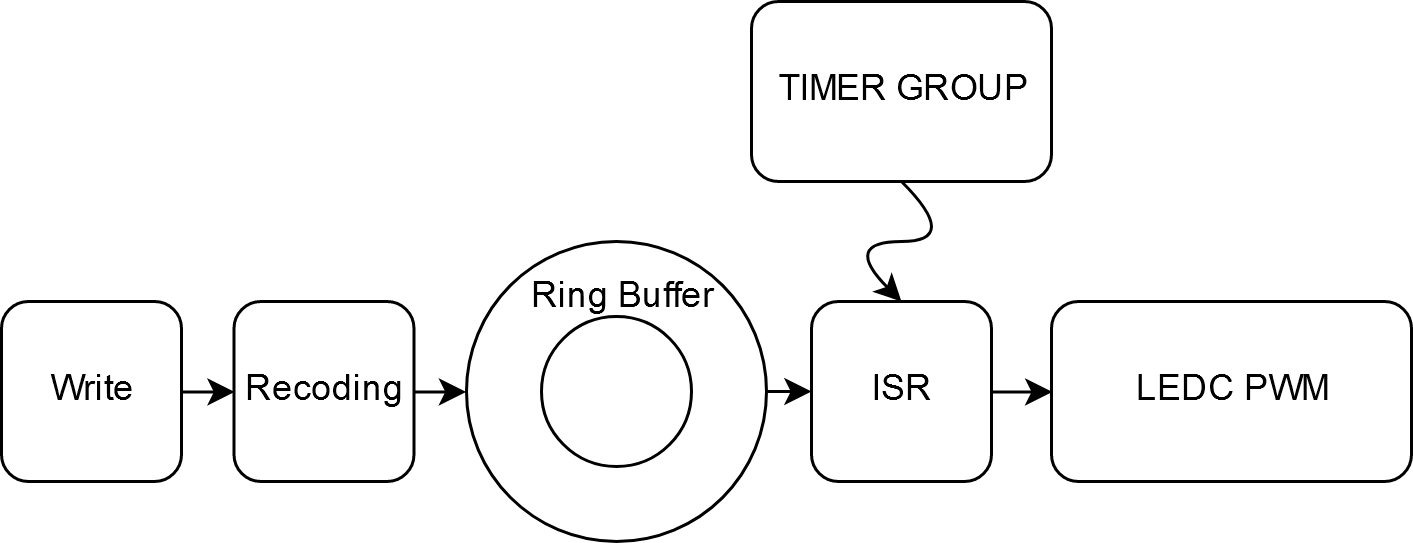PWM Audio¶
Supported Socs |
ESP32 |
ESP32-S2 |
ESP32-S3 |
ESP32-C3 |
The PWM audio function uses the internal LEDC peripheral in ESP32 to generate PWM audio, which does not need an external audio Codec chip. This is mainly used for cost-sensitive applications with low audio quality requirements.
Features¶
Allows any GIPO with output capability as an audio output pin
Supports 8-bit ~ 10-bit PWM resolution
Supports stereo
Supports 8 ~ 48 KHz sampling rate
Structure¶

Structure¶
First, the data is recoded to meet the PWM input requirements, including the shift and offset of the data;
Send data to the ISR (Interrupt Service Routines) function of the Timer Group via Ring Buffer;
The Timer Group reads data from the Ring Buffer according to the pre-defined sampling rate, and write the data into LEDC.
Note
Since the output is a PWM signal, it needs to be low-pass filtered to get the audio waveform.
PWM Frequency¶
The frequency of the output PWM cannot be configured directly, but needs to be calculated by configuring the number of PWM resolution bits, as shown below:
The \(f_{APB\_CLK}\) here is 80 MHz, and \(res\_bits\) is the number of PWM resolution bits. When the resolution is LEDC_TIMER_10_BIT, the PWM frequency is 78 KHz. As we all know, a higher PWM frequency and resolution can better reproduce the audio signal. However, this formula shows that increasing PWM frequency means lower resolution and increasing resolution means lower PWM frequency. Thus, please adjust these parameters according to the actual application scenario to achieve a good balance.
Application Example¶
pwm_audio_config_t pac; pac.duty_resolution = LEDC_TIMER_10_BIT; pac.gpio_num_left = LEFT_CHANNEL_GPIO; pac.ledc_channel_left = LEDC_CHANNEL_0; pac.gpio_num_right = RIGHT_CHANNEL_GPIO; pac.ledc_channel_right = LEDC_CHANNEL_1; pac.ledc_timer_sel = LEDC_TIMER_0; pac.tg_num = TIMER_GROUP_0; pac.timer_num = TIMER_0; pac.ringbuf_len = 1024 * 8; pwm_audio_init(&pac)); /**< Initialize pwm audio */ pwm_audio_set_param(48000, 8, 2); /**< Set sample rate, bits and channel numner */ pwm_audio_start(); /**< Start to run */ while(1) { //< Perpare audio data, such as decode mp3/wav file /**< Write data to paly */ pwm_audio_write(audio_data, length, &written, 1000 / portTICK_PERIOD_MS); }
API Reference¶
Header File¶
Functions¶
-
esp_err_t
pwm_audio_init(const pwm_audio_config_t *cfg)¶ Initializes and configure the pwm audio.
- Return
ESP_OK Success
ESP_FAIL timer_group or ledc initialize failed
ESP_ERR_INVALID_ARG if argument wrong
ESP_ERR_INVALID_STATE The pwm audio already configure
ESP_ERR_NO_MEM Memory allocate failed
- Parameters
cfg: configurations - see pwm_audio_config_t struct
-
esp_err_t
pwm_audio_deinit(void)¶ Deinitialize LEDC timer_group and output gpio.
- Return
ESP_OK Success
ESP_FAIL pwm_audio not initialized
-
esp_err_t
pwm_audio_start(void)¶ Start to run pwm audio.
- Return
ESP_OK Success
ESP_ERR_INVALID_STATE pwm_audio not initialized or it already running
-
esp_err_t
pwm_audio_stop(void)¶ Stop pwm audio.
- Attention
Only stop timer, and the pwm will keep to output. If you want to stop pwm output, call pwm_audio_deinit function
- Return
ESP_OK Success
ESP_ERR_INVALID_STATE pwm_audio not initialized or it already idle
-
esp_err_t
pwm_audio_write(uint8_t *inbuf, size_t len, size_t *bytes_written, TickType_t ticks_to_wait)¶ Write data to play.
- Return
ESP_OK Success
ESP_FAIL Write encounter error
ESP_ERR_INVALID_ARG Parameter error
- Parameters
inbuf: Pointer source data to writelen: length of data in bytes[out] bytes_written: Number of bytes written, if timeout, the result will be less than the size passed in.ticks_to_wait: TX buffer wait timeout in RTOS ticks. If this many ticks pass without space becoming available in the DMA transmit buffer, then the function will return (note that if the data is written to the DMA buffer in pieces, the overall operation may still take longer than this timeout.) Pass portMAX_DELAY for no timeout.
-
esp_err_t
pwm_audio_set_param(int rate, ledc_timer_bit_t bits, int ch)¶ Set audio parameter, Similar to pwm_audio_set_sample_rate(), but also sets bit width.
- Attention
After start pwm audio, it can’t modify parameters by call function pwm_audio_set_param. If you want to change the parameters, must stop pwm audio by call function pwm_audio_stop.
- Return
ESP_OK Success
ESP_ERR_INVALID_ARG Parameter error
- Parameters
rate: sample rate (ex: 8000, 44100…)bits: bit widthch: channel number
-
esp_err_t
pwm_audio_set_sample_rate(int rate)¶ Set sample rate.
- Return
ESP_OK Success
ESP_ERR_INVALID_ARG Parameter error
- Parameters
rate: sample rate (ex: 8000, 44100…)
-
esp_err_t
pwm_audio_set_volume(int8_t volume)¶ Set volume for pwm audio.
- Attention
when the volume is too small, it will produce serious distortion
- Return
ESP_OK Success
ESP_ERR_INVALID_ARG Parameter error
- Parameters
volume: Volume to set (-16 ~ 16). Set to 0 for original output; Set to less then 0 for attenuation, and -16 is mute; Set to more than 0 for enlarge, and 16 is double output
-
esp_err_t
pwm_audio_get_volume(int8_t *volume)¶ Get current volume.
- Return
ESP_OK Success
ESP_ERR_INVALID_ARG Parameter error
- Parameters
volume: Pointer to volume
-
esp_err_t
pwm_audio_get_param(int *rate, int *bits, int *ch)¶ Get parameter for pwm audio.
- Return
Always return ESP_OK
- Parameters
rate: sample rate, if you don’t care about this parameter, set it to NULLbits: bit width, if you don’t care about this parameter, set it to NULLch: channel number, if you don’t care about this parameter, set it to NULL
-
esp_err_t
pwm_audio_get_status(pwm_audio_status_t *status)¶ get pwm audio status
- Return
ESP_OK Success
- Parameters
status: current pwm_audio status
Structures¶
-
struct
pwm_audio_config_t¶ Configuration parameters for pwm_audio_init function.
Public Members
-
int
gpio_num_left¶ the LEDC output gpio_num, Left channel
-
int
gpio_num_right¶ the LEDC output gpio_num, Right channel
-
ledc_channel_t
ledc_channel_left¶ LEDC channel (0 - 7), Corresponding to left channel
-
ledc_channel_t
ledc_channel_right¶ LEDC channel (0 - 7), Corresponding to right channel
-
ledc_timer_t
ledc_timer_sel¶ Select the timer source of channel (0 - 3)
-
ledc_timer_bit_t
duty_resolution¶ ledc pwm bits
-
uint32_t
ringbuf_len¶ ringbuffer size
-
int